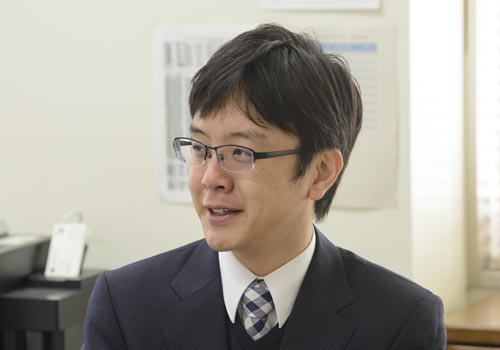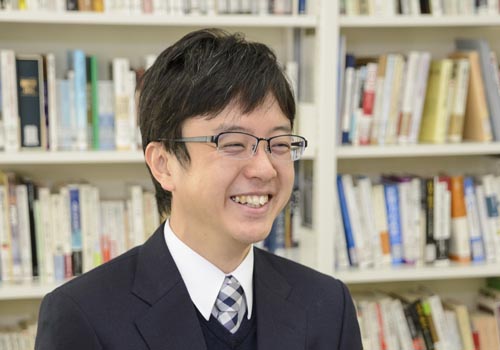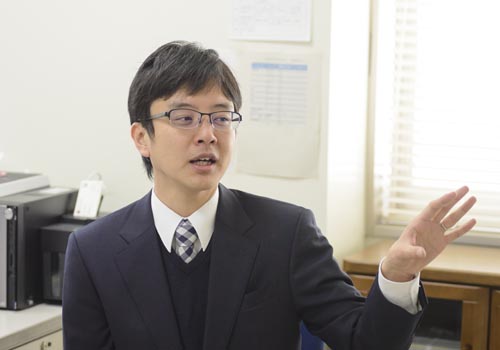
Special interview

Information moves the world, people and you while history creates the future
Nobuhiro Ihara
Associate Professor
【Graduate School of Informatics】
Global Media Research Center (GMRC)
【School of Informatics】
Department of Human and Social Informatics

Global attitude, as can be seen from past and current examples
-Please tell us about your research.
It is called image diplomacy. I am researching how Japan has increased its international image. It takes a historical approach and analyzes Southeast Asia in the 1970s. At that time in Southeast Asia, Japanese people were referred to as "Economic animals" and had an extremely bad image. This was despite the fact that Japan traded closely with the Southeast Asian countries and had a deep relationship and also invested and provided assistance in the area. This was because Japanese people considered profit first without regard for the local economy or development. So how on earth did the Japanese government improve this to leave a good impression? What activities were used by Japanese companies, bureaucrats as well as politicians? I am researching such matters.
Looking for the truth from various angles of international politics, information, media and culture
-What knowledge and methods are available to research this?
International political science of course and because the Japanese government sent out information under the heading of "Japan is contributing greatly to the local economy" the fields of informatics, particularly international informatics and information politics so we also need this knowledge. Advertising was also an important tool to improve the image of Japan so media research will also become necessary. Furthermore, cultural cooperation and cultural exchange were also used as a means to improve the image so cultural studies are also involved. It is very interdisciplinary and many fields overlap. More specifically, we are using methods to interpret what bureaucrats and politicians were thinking and what the government was attempting to do, through the use of mainly official documents from the time.

Research is going to expand and develop through current knowledge from history
-Professor Ihara, what kind of things will we be able to see from your research?
It is historical research so it is difficult to see direct connections to the present day. However, it is a fact that understanding history is a shortcut to understanding the present day. When trying to investigate Southeast Asia in its current state, the image of Japanese people is at a very good level. Attempts to improve people's impression of Japan from the 1970s are considered as having been a success. So Japan's image has improved in Southeast Asia but why has it not improved in Korea or China? How can Japan utilize results from the past for its relations with Korea or China? It is these questions that next come to mind. By understanding history, research has the potential to expand and develop so that we can think about the current and future questions.
I myself have also been made in the same way as developments from a complexly entangled history
-Can you tell us the background details that led to the current research?
The theme of my master's thesis, which started with research into the field of international politics was about national security and has no relevance today. I wrote about establishing an alliance among the ASEAN and Southeast Asia countries for my doctoral thesis. After this, my interest further grew in culture and media research due to my affiliation with the media professional theory lecture course from the International Language and Culture Studies at Nagoya University. Then I was affiliated with the global media research center and I started to really research Japan's image, which was targeted by the center for research. The current research theme came about while I was adapting to my own affiliation. What I mean is that the current research was something that came about by chance while assisting in the work and not something I calculated from the beginning. From now, I will be affiliated with the school of informatics so I believe my research will probably change even more. Also, the reason I came to enjoy research was greatly influenced by the fact that the teachers at the seminar were very friendly when I was an undergraduate. My own curiosity and interest changed due to the people I met. Actually you could say this is the real thrill of historical research. History is not entirely calculated. History is made by chance and inevitability and various intertwining factors. I believe this is the same as how I came to be interested in this research.

Experience various things and change society by transmitting information - Studying informatics is said to be a currently desired human resource
-Do you have a message for students wishing to join the school of informatics?
I used to dislike studying (laughs) and did not like history. However, I wanted to go overseas and when I was a university student I learnt about international politics and culture. As I just talked about, me disliking studying greatly changed after meeting the teachers of the seminar and after I became a researcher I had the opportunity to experience a variety of information at each organization I was affiliated with, which also changed what I was interested in. At university, you should definitely experience various people and knowledge and try to have an interest in many things.
I think that there are many people who want to study various things at the school of informatics and they will cover both the sciences and the arts. Digitization of information is progressing so it is an advantage to be a person who has knowledge of the sciences relating to information as well as for art students. These type of people are probably exactly the human resources desired for the modern age. For example, in 20 years it might be that companies are almost non-existent and individuals can create various jobs and achieve results. When this happens, if a person has both scientific power, for example, the technique to write a program, in addition to arts, for example, the power to read international situations, it will most likely be a huge strength. The school of informatics is where you can study this so I would like all the students to work hard at this.
When you enter the school of informatics, don't just listen to the lectures and input it into your brain. I want the students to also learn the method to output what they have learnt. If the teacher appears intellectual, it is because they always have classes each week and are outputting what they have learnt themselves. Outputting knowledge also firmly establishes your own knowledge and will lead to improvements in social trust such as people saying "it is best to listen to that person for this field". Of course, it is important for all students to put effort into input, for example, reading books, traveling and having new experiences. Information can move people so by outputting the various knowledge you have inputted you may be able to change yourself, the people around you and the people throughout the world. Now you can rapidly transmit information using SNS. You might really be able to influence the various people throughout the world. I would like the students to study while believing in a desire to make some kind of contribution to the world and that they can change the world and society!
